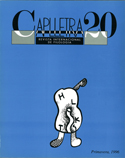L'augment verbal romanç -ez-/-iz-: derivació vs. flexió
DOI:
https://doi.org/10.7203/caplletra.20.7356Keywords:
augment verbal romanç en -ez-/-iz-, derivació, flexió Abstract
Abstract
Ancient Greek could form denominal verbs by attaching a palatal semivowel to the noun stem and adding the verbal endings, thus creating verbs in -izo, -azo [això, clar, en caracters grecs], etc. Latin borrowed large enough numbers of those with vocalism in -i- so that an independently productive derivational pattern arose in Latin. As with the case of the native Latin -sk- affix, the -iz-/-ez- element developed a flexional role in some varieties of Romance. The derivational function, however, remained dominant and was even propagated to the Germanic languages.
 Downloads
Downloads
Downloads
Published
How to Cite
-
Abstract256
-
PDF (Català)94
Issue
Section
License
Authors submitting work to Caplletra for publication must be the legitimate holder of the usage rights. Legitimacy for the purposes of publishing the work must also include images, tables, diagrams and any other materials that may complement the text, whether they are the author of such material or not.
Copyright: on publishing their work in the journal, the author grants Caplletra. Revista Internacional de Filologia usage rights (reproduction, distribution and public communication) for both the paper printed version and for the electronic version.
All work published in Caplletra is covered by the Creative Commons license type Attribution-NonCommercial-NoDerivatives 4.0 (CC BY-NC-ND 4.0).
RESPONSABILITY
Caplletra. Revista Internacional de Filologia does not necessarily identify with the points of view expressed in the papers it publishes.
Caplletra. Revista Internacional de Filologia accepts no responsibility whatsoever for any eventual infringement of intellectual property rights on the part of authors.






